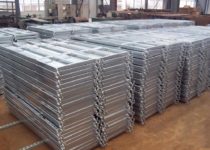Scaffolding Standards vs Quality vs Price: A Middle East Dilemma

In the dynamic industrial and construction markets of the Middle East, scaffolding has become more than just an accessory — it is a critical lifeline for safety, progress, and compliance. With mega-projects across the region led by oil & gas giants such as Aramco, SABIC, and ADNOC, the demand for OSHA, EN, and BS compliance of scaffolding has grown louder — at least in pre-qualification documents.
But the reality on the ground tells a different story.
The Compliance Paradox
In pre-tender meetings, technical submittals, and project scopes, clients demand the highest international safety standards EN 12810/12811, BS 1139, and OSHA 1926. These standards ensure structural integrity, worker safety, and legal protection. Rightfully so, any compromise here puts lives and reputations at risk.
Yet, during price negotiations, the conversation often pivots. Suddenly, clients begin benchmarking offers against non-compliant, substandard products that do not meet the specifications they initially insisted upon—turning to manufacturers who cut corners. This creates a dangerous paradox where standards are discussed, but not paid for.
The Price Trap: When Safety Becomes Negotiable

The Middle East market—particularly in Saudi Arabia and the UAEis becoming increasingly cost-driven. Buyers often look for cheaper alternatives, second-hand products, or materials sourced from manufacturers who cut corners and cheat on specifications. Common compromises include reduced material thickness, poor galvanizing quality, inadequate welding procedures, and skipped load-bearing tests.
Manufacturers like SPAR STEEL, who have deep industry expertise, invest significantly in quality and compliance of British, American, and European Standards, viz. BS1139, BS EN10219, ANSI 10.8, and OSHA 1926. Their approach includes:
- Using raw materials sourced exclusively from certified mills,
- Designing and load-testing products to meet stringent EN/BS standards,
- Ensuring hot-dip galvanizing is performed according to ASTM A123,
- Obtaining third-party certifications for reliability,
- Undergoing rigorous factory audits from leading entities such as ADNOC, SABIC, and ARAMCO.
These substantial investments directly impact product pricing. However, the market does not always value transparency and strict compliance, making it challenging for such manufacturers to compete purely on price. Their dedication to raising industry standards is clear, yet the competitive landscape often prioritizes cost over certified quality and verified processes. This puts responsible manufacturers at a disadvantage, despite their leadership in compliance and product integrity.
The Challenge for Genuine Manufacturers

Companies like SPAR, which manufacture cuplock, tube & fittings, ladder beams, and scaffolding boards as per global standards, face resistance not due to product shortcomings but because of market distortion caused by low-cost, low-quality imports.
The impact?
- Losing tenders to non-compliant vendors
- Delayed payments due to disputes on quality
- Constant justification of pricing to technically aware but commercially
influenced buyers
- Undermining the safety narrative that was initially prioritized
A Call for Accountability & Long-Term Thinking
The burden of enforcement cannot rest on manufacturers alone. There needs to be accountability at all levels:
- Procurement Teams must align commercial choices with the approved technical specifications.
- Consultants should refuse to approve substandard materials at the site level.
- EPCs and End Users like Aramco, SABIC, and ADNOC should implement strict vendor audits and blacklist non-compliant suppliers.
- Industry Regulators must penalize misrepresentation of standards and fake certifications.
The Real Cost of “Cheap”

The industry must recognize that the lowest price does not always equal the lowest cost. Accidents, rework, project delays, and damaged reputations incur far greater costs than the few dirhams saved per meter of scaffolding.
It’s time Middle East buyers revisit the basics:
- Standard = Safety
- Quality = Durability
- Compliance = Accountability
In conclusion, Integrity Shouldn’t Be Negotiable
As a responsible and certified manufacturer, SPAR STEEL is committed to safety, compliance, and quality. The company’s struggle to convince buyers of these values highlights a deeper issue: the urgent need for ethics-driven procurement in the scaffolding industry.
Until the market rewards honesty and compliance over shortcuts and cost-cutting, the cycle will continue. But for those who understand that safety is not optional, companies like SPAR will remain the trusted choice — even if the road is longer.
For more insights or to connect with SPAR STEEL’s technical team, visit www.sparsteel.com or contact info@sparsteel.com



